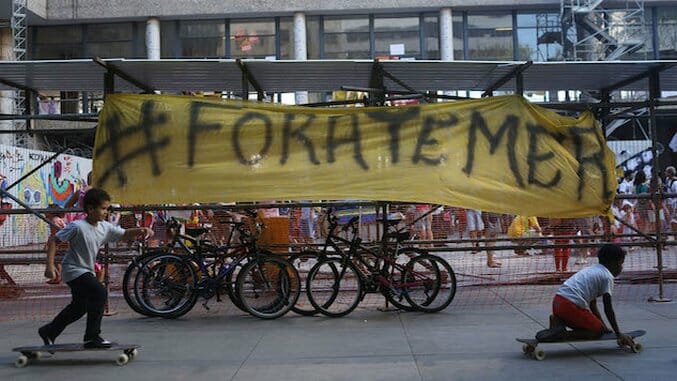“Fora Temer!” Paste’s Guide to the Brazilian Political Crisis
What's behind it, and how the Olympics might be affected
Photos courtesy Getty Images
Brazil is rapidly approaching a historic milestone: in August, Rio de Janeiro become the first South American city to ever host the Olympic Games. But there’s another, less auspicious, Olympic milestone that will be crossed soon, too: Brazil will be the first country to feature two host presidents at its opening ceremony. Dilma Rousseff, the country’s president and self-proclaimed “mother” of the Rio Olympics, has been suspended from office and is awaiting trial in what her supporters say amounts to a coup. The organizer of her ouster, her former vice-president Michel Temer, has been asked by Olympic organizers to preside at the opening ceremony as the country’s interim president—but Rousseff has been granted an invitation well.
The country’s National Congress has become a battleground between Rousseff’s Workers’ Party against its opponents on the right, with politicians of all stripes drowning in a massive corruption scandal. These concerns are all underscored by a substantially downtrodden economy. The upcoming Olympic spotlight attracts the attention not only of Brazilian authorities, but of nations and organizations from around the world, which unsatisfied citizens might exploit to voice their dissatisfactions. So what can visitors and viewers expect from the Brazilian public at the world’s biggest international sporting event?
The context of the country’s woes is lengthy. Rousseff was officially suspended on May 12, and now must wait for her impeachment trial, which is due to happen sometime within 180 days of the suspension. The public has responded to Temer’s ascencion to the presidency in many ways, most commonly with the phrase Fora Temer, which means “Temer, Get Out.” This tagline has popped up all over the country in the form of graffiti, posters, tweets, and in speeches, a shorthand for what many consider to be an illegitimate government.
Rousseff stands accused of mismanaging federal funds and distorting national economic performance. She has denied these accusations, and in June independent auditors hired by the senate found these allegations to be without merit. Rousseff’s party, the Worker’s Party or PT, ushered in an unprecedented era of economic growth thanks to its consensus-based approach to governance. Rousseff worked hard to establish an anti-corruption reputation, but her tenure as the chairwoman of the Petrobras board when nearly 20 billion Reais (US$5.3 billion) was illegally exchanged in the form of bribes has called that reputation has come into serious question.
The web of corruption in Brazil is far-reaching, due to a long history of economic inequality and invulnerable politicians. Combating white-collar crime is nearly impossible. Many in Brazil’s National Congress enthusiastically supported Rousseff’s impeachment under the guise of condemning corruption—yet more than 150 of those same Senators and Deputies are under investigation for crimes ranging from illegal enrichment to even to attempted murder. The Petrobras corruption investigation is known as Operação Lava Jato (Operation Car Wash), because one of the first money-laundering fences the authorities discovered executives using was a car wash business.
Petrobras, officially known as Petróleo Brasileiro SA, is an oil & gas giant that played a large role in energizing Brazil’s economy in the past decade. The corruption within it took the form of a cartel, in which Petrobras leaders allowed a group of construction companies to massively overcharge them in their development contracts. Construction executives would keep the surplus from these contracts, and return some of it to Petrobras leaders, as well as helpful politicians, as kickbacks. They would also keep some for themselves. Since Petrobras is state-run, these bribes often took the form of campaign donations. Even though Rousseff denies any knowledge of corruption while she was chairwoman, many have suggested that she is guilty not only of financial negligence, but abusing the public-private ownership structure of Petrobras and funding her election campaigns with stolen money. Furthermore, the same companies that organized this cartel with Petrobras are now expected to build the majority of Olympic infrastructure and stadiums.
Brazil’s political crisis began to receive international attention around the same time that the world eagerly turned its gaze towards Rio in anticipation of the Summer Games. Demonstrating the unbelievable growth the country had experienced recently was a major element of the Brazilian bid for the Olympics, yet Brazil, despite having the strongest South American economy, has been struggling through one of its worst recessions in almost a century. Mario Andrada, the Organizing Committee director of communications, has claimed that “no other country in Olympic history has lived through such difficult political times so sharply close to the Games.”
-

-

-

-

-

-

-

-

-

-

-

-

-

-

-

-

-

-

-

-

-

-

-

-

-

-

-

-

-

-

-

-

-

-

-

-

-

-

-

-








































